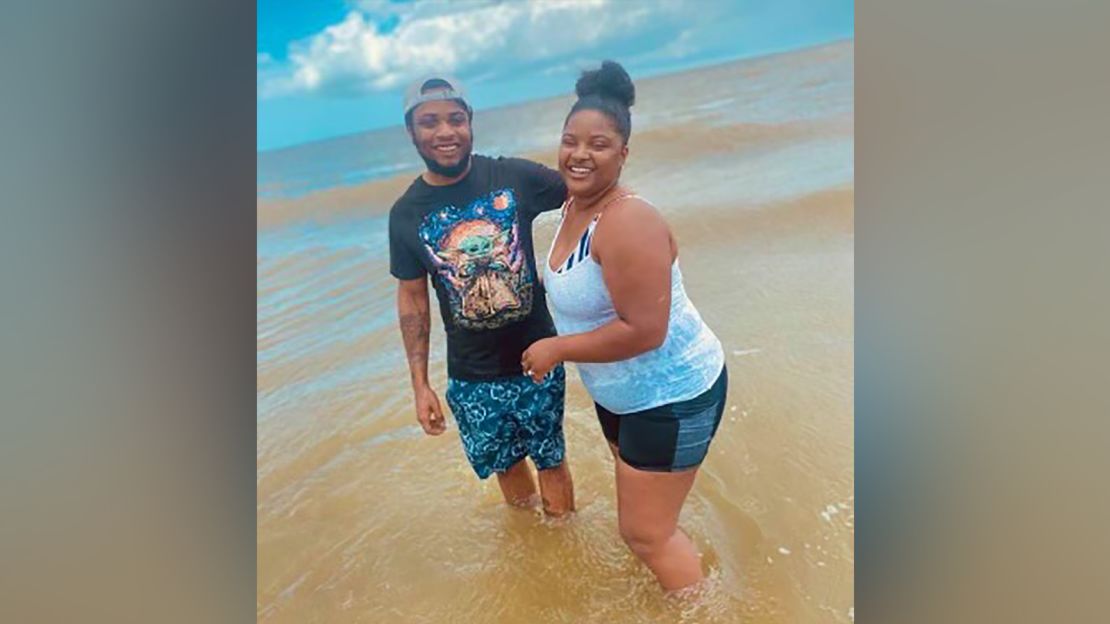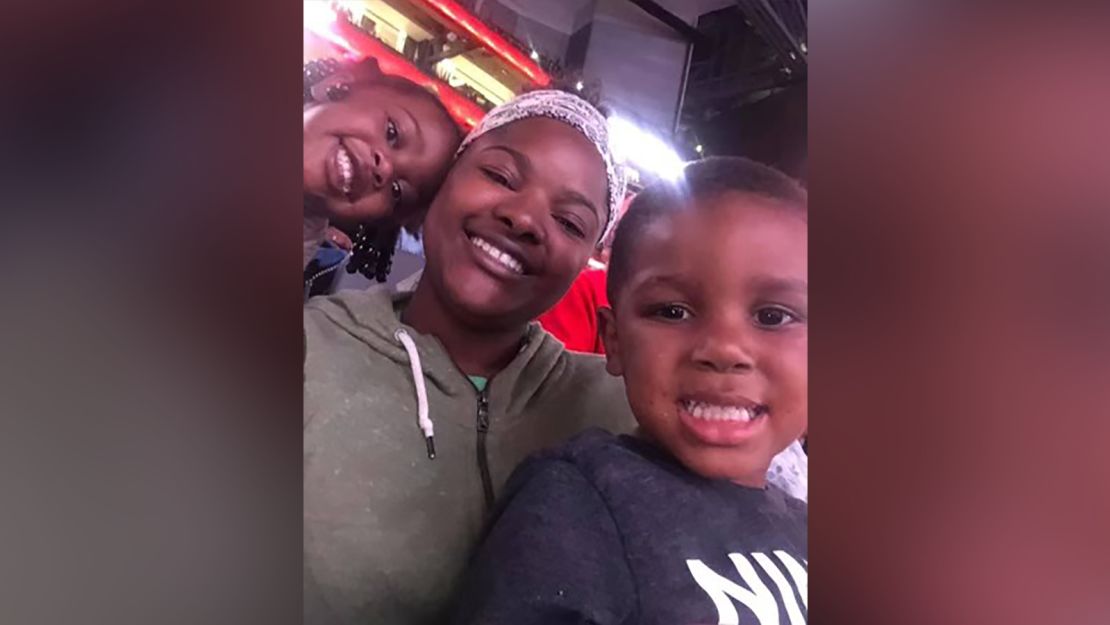Marrisha Kindred Jenkins was 33 weeks pregnant when she started complaining of a persistent cough and vomiting last month.
Her mother, Helena Kindred, said she became concerned that Jenkins’ symptoms sounded more severe than a common cold and advised her to skip a family member’s birthday party on Sept. 4. Later that day, Jenkins went to a metro Atlanta hospital where doctors diagnosed her with Covid-19 and pneumonia.
Jenkins, who was unvaccinated, went into labor a few days later and delivered her baby boy Jaylen prematurely but couldn’t hold him because she was still infected. The 27-year-old was discharged from the hospital before fully recovering, Kindred said. She was short of breath in the days to follow.
On Sept. 23, the Georgia mom of three died from Covid-19 complications.
Now Helena Kindred is pleading for other pregnant Black women to get vaccinated, saying she believes Jenkins would have survived had she gotten immunized.
“My message is please, please, please get vaccinated,” Jenkins said in an interview with CNN. “To me it’s important for you to do it for you and your baby.”

Pregnant Black women have the lowest vaccination rates in the country compared with other racial groups, according to the US Centers for Disease Control and Prevention. As of Oct. 9, 18% of pregnant Black women, 28% of pregnant Latino women, 35% of pregnant White women and 48% of pregnant Asian women were fully vaccinated. The total vaccination rate for all pregnant women was 33%.
Doctors say the figure for pregnant Black women is alarming given they are more likely to die from pregnancy complications than any other demographic group. Health advocates believe the pandemic has the potential to worsen the Black maternal health crisis, especially if Black moms aren’t getting immunized.
The National Center for Health Statistics published an analysis of maternal deaths in 2019 that found 754 women died during pregnancy or within 42 days of giving birth in the US that year. Black women fared worse than any other demographic, with 241 Black women dying in pregnancy, childbirth or after giving birth.
The CDC has urged all women to get vaccinated before or during pregnancy because the benefits outweigh any potential risks.
Pregnant women with symptomatic Covid-19 face a higher percentage of emergency complications compared to those who tested positive for the virus, but did not have symptoms, according to a new report presented earlier this month at the Anesthesiology 2021 Annual meeting. The virus can also cause preterm birth or babies born so sick they have to go straight to the neonatal intensive care unit, or NICU.
But the national health guidance hasn’t been enough to convince some Black mothers to get the vaccine, underscoring the distrust some Black Americans still have of doctors and science. The nation has a history of racism in medical research.
Black Americans remain underrepresented in vaccinations relative to their share of the population. However, in the last two weeks they accounted for 11.4% of new vaccinations– a larger share than they have in the past.
Dr. Joia Crear Perry, president of the National Birth Equity Collaborative, said there needs to be more messaging about the vaccine that specifically targets pregnant Black women.
Many pregnant Black women, Perry said, don’t have a doctor they trust and are listening to misinformation that says the vaccine could harm them and their baby.
Perry said doctors working in obstetrics and gynecology need to boost their efforts to build trust with Black moms by working with health advocates, midwives and doulas to connect with Black communities. Doctors, she said, need to have conversations with these communities where they are honest about the history of racist medical studies and explain why the Covid vaccine is different and why it’s safe.
“It is safer for you and the baby to be vaccinated than to catch Covid by far,” Perry said. “We want you and your baby to be healthy and not be sick and the vaccine is the best way to do that.”
Dr. Jamila Perritt, president and CEO of Physicians for Reproductive Health, agreed that not enough Black pregnant women are getting the the right message about the vaccine.
Perritt said many moms are hesitant because initial reports said pregnant women were not included in vaccine trials but as the year progressed, health leaders put out stronger recommendations for them to get the shot.
The changing information combined with the existing distrust in doctors is contributing to the low vaccination rates, she said.
Perritt worries that if health leaders don’t convince more Black moms to get the vaccine, the maternal health crisis will be exacerbated.
“I’m terrified by it,” Perritt said. “We have yet to see the impact that this is going to have on our communities writ large.”
Some mothers remain skeptical
Some unvaccinated Black pregnant women say they aren’t necessarily against the vaccine, but would rather wait and get it after giving birth.
One of those women is Shannon Burton who is 33 weeks pregnant. Burton, 36, of Philadelphia, said she doesn’t trust the science enough to get vaccinated while carrying a baby that is still developing.
She feels more comfortable receiving the shot while she’s breastfeeding.
“If it works well with my body then she will get the antibodies from me,” Burton said. “I’m not letting them stick something in my body and I don’t know what the side effects are (on a pregnant woman).”
Research shows that getting vaccinated while pregnant will transfer antibodies to the developing baby that will help protect it from Covid-19.
Alexia Doumbouya, a Philadelphia-based doula, said some mothers tell her there isn’t enough research on the vaccine’s impact on pregnant women. Others say they aren’t convinced the vaccine will fully protect them given the breakthrough cases reported from the Delta variant.
CDC officials maintain that Covid-19 vaccines are safe and effective for women who are pregnant, postpartum, breastfeeding or trying to get pregnant.
Doumbouya said she knows the vaccine is safe for moms and babies and urges the pregnant women she works with to get vaccinated. For those who decide against it, Doumbouya tells them to get tested regularly for Covid-19.
As a Black doula, Doumbouya said most moms typically consider her advice.
“When I do talk to moms they are more likely to take my suggestions, and hear my heart because they say ‘she’s a Black woman and she’s not going to tell me the wrong thing,’” Doumbouya said. “They feel like they can trust us a lot more.”
‘Protect yourself and your baby’
Within that 18% of vaccinated pregnant Black women are moms who say they made the best choice for their health and their baby’s health.
Kayci Moodie, who is 23 weeks pregnant, said she was vaccinated one month before conceiving her baby. Moodie said she didn’t listen to myths that the vaccine could cause infertility because she trusted the years of research behind mRNA vaccines.
Now Moodie said she finds comfort in knowing the vaccine lowered her risk of being hospitalized with Covid-19.
“I do know that, being pregnant, I’m already immunocompromised,” Moodie said. “Everything is dangerous being pregnant so why wouldn’t you boost your immunity during a pandemic to protect yourself and your baby?”

Helena Kindred, meanwhile, said she’s encouraging the vaccine so another family doesn’t have to suffer the same devastation that hers is enduring.
Marrisha Kindred Jenkins leaves behind her husband and three children who will now grow up without their mother. Kindred wants Jenkins to be remembered as a devoted mom who loved to travel and take her children on vacations. The family held a memorial service to honor Jenkins on Friday.
“I just can’t believe that she’s not here,” Kindred said. “It’s like I’m in a dream and can’t wake up.”




